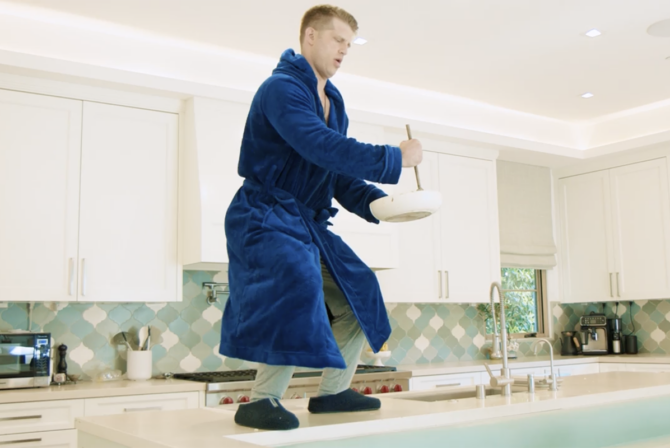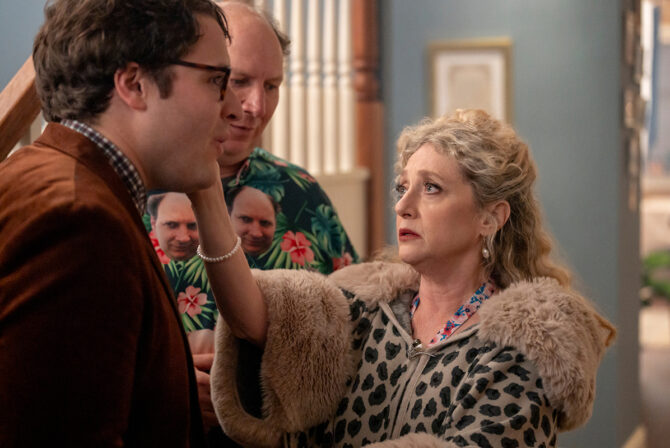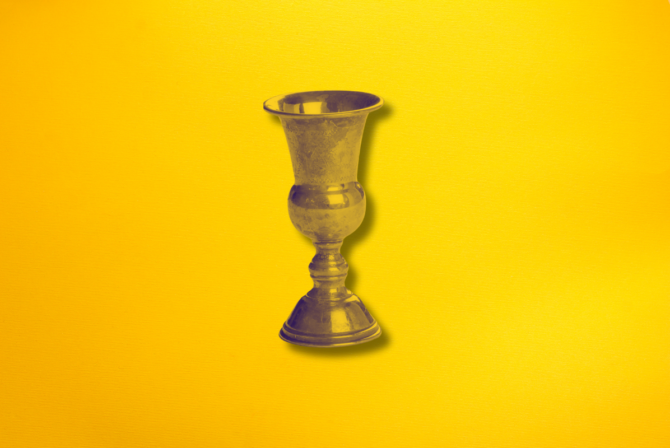This month, the Kveller Book Club read the new novel The Mothers by Jennifer Gilmore (just in time for Mother’s Day, no less). Below, some Kveller contributing editors chat about the book, about the harrowing process of adoption, the essence of “motherness,” and cleaning up baby vomit.
Reminder: Be sure to join us for our Twitter chat with Jennifer Gilmore (@Jenwgilmore) TODAY from 12-1 p.m. EST. Follow along with #KvellerLit.

Adina
: Hi, all. Since this book is called The Mothers, it makes sense to start with that totally loaded word. Early in the novel, the main character, Jesse, who desperately wants a baby and is struggling her way through the adoption process, begins musing on what a mother “does.” She says, “…[a mother] fixes the past from the future. If you cannot be a mother, how do you fix the way in which you were mothered…”
The thing is, I don’t think I’ve ever considered my role as a mother as being related to “fixing the past,” at least not consciously. However, I am constantly aware that with each passing day I am becoming more and more like my own mother without even trying. Maybe that’s what a mother does: she edits herself until she becomes a version of her own mother that she’s comfortable with.
 Jordana: Well, I’m the goody-two-shoes who in many ways wants to replicate the way I was mothered. My mom is amazing. She was a mother of four kids and yet gave each of us the attention and love of an only child. [My mother] saw us for who we were and nurtured that element of us. In other words, she quickly saw each of us as individuals, not just as children. My brother was not particularly good at schoolwork (a very hard thing in a family of female academic A students) but was an amazing artist. Therefore, she found art classes and camps for him, and nurtured his talent, and he ended up becoming a professional animator. She said, “Here’s where your talents lie–let’s make sure you make the most of them.”
Jordana: Well, I’m the goody-two-shoes who in many ways wants to replicate the way I was mothered. My mom is amazing. She was a mother of four kids and yet gave each of us the attention and love of an only child. [My mother] saw us for who we were and nurtured that element of us. In other words, she quickly saw each of us as individuals, not just as children. My brother was not particularly good at schoolwork (a very hard thing in a family of female academic A students) but was an amazing artist. Therefore, she found art classes and camps for him, and nurtured his talent, and he ended up becoming a professional animator. She said, “Here’s where your talents lie–let’s make sure you make the most of them.”
 Debbie: I feel like the idea of “fixing the past” is a slightly different way of saying that having kids allows you to relive your childhood. And if you can’t be a mom, then how the hell are you going to repair your miserable chubby awkward childhood?
Debbie: I feel like the idea of “fixing the past” is a slightly different way of saying that having kids allows you to relive your childhood. And if you can’t be a mom, then how the hell are you going to repair your miserable chubby awkward childhood?
 Carla: I think becoming a mother can open up things about our childhood that we may have thought were resolved. (I like to think of it like having our snow globe shaken all over again.) It looks different for everyone; for some of us it’s about trying to recreate our childhoods, for others, it’s about trying to do it differently. We all approach parenthood with different levels of awareness–if we’re lucky (and if our children are lucky), we have some insight into the parenting we did or didn’t receive, and how it impacts and shapes us, both positively and negatively. The more awareness we have, the more choices we can make about how we want to parent (as opposed to reacting to that which we haven’t yet resolved).
Carla: I think becoming a mother can open up things about our childhood that we may have thought were resolved. (I like to think of it like having our snow globe shaken all over again.) It looks different for everyone; for some of us it’s about trying to recreate our childhoods, for others, it’s about trying to do it differently. We all approach parenthood with different levels of awareness–if we’re lucky (and if our children are lucky), we have some insight into the parenting we did or didn’t receive, and how it impacts and shapes us, both positively and negatively. The more awareness we have, the more choices we can make about how we want to parent (as opposed to reacting to that which we haven’t yet resolved).
How’s that for social work psychobabble?
Adina: Speaking of psychobabble, did any of you find that Jesse was too obsessed with becoming a mother?
Carla: No, I don’t think she was too obsessed with becoming a mother. My journey to parenthood was nothing like Jesse’s, as we had a fairly easy journey through IVF, but I do remember the year we spent trying to get pregnant (unsuccessfully), and the months of tests and interventions we went through before we learned I was pregnant. It was far from easy, and I remember thinking about whether or not I was pregnant all the time. It was consuming. So, no, I don’t think she was too obsessed. It’s just how it can get.
Adina: That’s totally true. We didn’t struggle to get pregnant but I was obsessed nonetheless. I remember–just as Jesse describes in the book–feeling as if there were strollers and bottles and sippy cups and belly bumps everywhere I looked. Somehow, when you’re turned on to something, it appears all over the place, right before your eyes. It was as if an entire procreating underworld revealed itself to me the minute I became involved in procreation myself.

Molly
: I don’t know if Jesse was too obsessed with becoming a mother, but I did find myself thinking about the fact that this book is about one thing, and one thing only. In most novels there’s the main story line, and then all these other sub-plots going on that sort of bulk it up and make it feel more true to life–when are there not a handful of subplots going on in our lives? This book is wholly about the adoption process, and everything that happens is very closely connected to that story. I could see this as being a downfall for the book, or I could think of it as Gilmore making a statement–that when you are going through the process of adopting, it takes over your life. There is nothing else going on. There are no subplots. I really don’t know if that’s true, but I’d be curious to hear what other people who have adopted think.
Adina: Were there any aspects of the adoption process that Jesse and Ramon experienced that surprised you?
Molly: I would have never thought that it would be so common for birthmothers to lie to prospective adoptive parents during their first communications, and especially shocking that some of them might not even be pregnant. The thought that people would “troll” people in their most vulnerable state is so sad and infuriating, but I also understand the compulsion to lie–afterall, the birthmothers are also in an extremely vulnerable state and are trying to figure out what will be best for their child. I bet if we read a novel from one of the birthmother’s perspectives, we’d be sympathetic to her, even if she was one of the liars.
Carla: I was pretty surprised that the adoption agency in NYC wouldn’t place with gay couples. And I guess I was also shocked and saddened by the process of what Jesse and Ramon had to go through to adopt. As someone who went through IVF with my husband, I was painfully aware of the choices we had to make that parents who conceived without assistance didn’t. For example, we had to decide how many embryos to transfer back into my uterus–I remember agonizing about whether we should transfer one (lower risk of twins, but also possibly lower likelihood of getting pregnant) and what will happen to the embryos we don’t use. The experience of these characters in the book was magnified by a million! They had so many choices to make about the biological parents of their child (race, geographical location, age, history of mental illness, drug abuse, etc.) AND they had to share so many details about themselves–they had to pass so many tests that biological parents never do. And the stakes are SO high. The writing about this process was so heartbreaking.
Adina: I agree, the writing is heartbreaking–and so vividly rendered. You can feel Jesse’s want laced through every page. Reading the book, I couldn’t help but constantly click over to Gilmore’s essays in the
New York Times
, the
Huffington Post
and elsewhere, places where she wrote nonfiction about her own adoption journey. How did you guys feel about the fact that she chose to write this book as fiction instead of writing a memoir about her experience?
Jordana: It didn’t bother me that the book was so autobiographical, though I did want to ask her why she made the choice to write it that way rather than a memoir. If I had to guess, I would say that memoirs get more press in the moment but in the long run are more easily forgotten, whereas fiction is deemed to have staying power beyond the headlines it captures.
Carla: I guess I felt a little… weird? Maybe even betrayed… when I learned that Jesse’s story paralleled Jennifer’s so closely. It wasn’t a huge deal, but it did make me wonder, however briefly, why she didn’t just tell the story as a memoir, as Jordana said. I wondered what she left out, what she changed, and what she didn’t want us to know.
Molly: It does not bother me at all that this book was written as fiction instead of memoir, and I sort of hate how much reviews focus on that aspect. Writing a novel and writing a memoir are completely different beasts, and we have to trust that Gilmore chose to write a novel because that’s how she felt she could best tell this particular story. The fact that it’s so autobiographical just says to me that it’s coming from an honest place, that the emotions are real and true. That’s much more meaningful to me than whether the events and characters are real and true.
Adina: I think maybe the fiction format also allows for more rumination and poetically rendered reflection. It might take years for someone to write a memoir with that kind of insight into themselves, but in fiction, Gilmore was able to access parts of herself and then infuse the rest of Jesse’s character with fantasy.
Jordana: I also think Jesse’s particular path INVITED, if not rolled out the red carpet for, endless musing on motherhood. I loved one passage where she talked about making pies with her would-be child. No one ever rhapsodizes, either before or after having children, about cleaning their vomit out from between the planks of a hardwood floor, yet these kinds of moments are just as real as pie-baking, even if not as appetizing.
Debbie: Just this morning I had to clean up both baby vomit and an entire bowl of cereal from between the planks of the hardwood floor!
Jordana: SEE? 🙂
Carla: That’s why I don’t feed them…Just kidding.
Adina: But I guess this begs the question: why do we want babies so much if all they do is puke all over our wide-planked hard wood floors? In her review of The Mothers for the New York Times, none other than Molly Ringwald questions whether or not it was clear why Jesse wanted a baby so much.
Carla: I am a huge Molly Ringwald fan, but that statement struck me as completely absurd. Why do any of us desire motherhood, and why is that for anyone to question? Now, whether or not Gilmore did a good-enough job explaining Jesse’s fixation on motherhood in the context of this book may be a reasonable question, but I actually don’t think she HAD to explain that. I think it’s just a given.
Adina: Despite the sorry state of puke on nice floors, I agree. In fact, in my most exhausted moments, I’ll sometimes find myself fantasizing about having more children. That’s definitely not rational, not in light of the all-consuming craziness that is our lives with children. And yet. Nothing about this relationship of mother-child or parent-child or caregiver-child is entirely rational and I wouldn’t want it to be. Aside from saying how much I love the kids I already have, I would find it hard to “explain” why sometimes I think I would flick off the doubts and get pregnant in an instant if I thought my husband wouldn’t leave me for a more rational woman. (Kidding!)
This brings me to one last question for you: In the book, Jesse wonders: “what will it be like? Who will I be if I become a mother? What will be gained and what will be lost? Will I be the same woman to myself? To the world?”
Did you guys connect to any of these questions?
Carla: I guess we all have some of those thoughts/fantasies/imaginations during pregnancy (and the attempts to get pregnant), but at least in my case, I didn’t feel like I knew the “right” questions to ask or fantasies to have because I had no idea what was in store for me. I was scared and worried about childbirth, and I just wanted a healthy kid, honestly. And the once the baby came and I was a mother, I was way too exhausted and overwhelmed with all of the tiny yet seemingly huge details of caring for this child. Now that I’m out of the weeds (mostly), those questions just don’t seem so interesting to me… I just am. I am a mother, a wife, a writer, and a social worker. I just don’t find that level of navel-gazing to be particularly interesting at this point.
Jordana: Yes, yes, yes. What will be gained and what will be lost? Will I be the same woman to myself? To the world?
I believe so much more is gained than what is lost. Things that are lost, for me, at this point are distant memories, but sometimes fond ones. I remember dimly the comparative luxury of scheduling without shuffling, back when a friend could call you and ask for dinner and you could actually go! On the same day! Without hiring a babysitter! And without feeling any guilt whatsoever! I remember sleeping late on weekends; I remember going to the bathroom uninterrupted.
“Me time” is a thing of the past. It comes back eventually, but I think by the time it does, the “me” will be irretrievably different from the “me” I was before. And I’m okay with that. Being a mother, and parenting, has made me grow as a person. It’s tested my borders and limits, my sanity – and has expanded my ability to love.
I am not the same woman to the world, though, and not for these good reasons: this is the part that bothers the crap out of me. I’m seen as a ‘mother,’ not as a ‘person.’ Mothers ARE people. Mothers are people with the added dimension of caring intensely for, and nurturing, other, smaller people. But we are no less people because we carry a diaper bag. Yet our society devalues mothers intensely, both implicitly and explicitly.
Adina: Which brings us to the end. Despite that, despite the devaluation and the lost “me” time and the puke on the floors, when Jesse gets that call (spoiler alert) from the adoption agency on one of the very last pages of the book and she sobs, I sobbed too. The promise of knowing that unfettered joy, the promise of a tiny hand gripping yours–it’s the stuff of fairytales, of fiction of the highest order, and we should all be able to have that, to find that, if that’s what we want. The blinding, bracing love that you are treated to when you’re a parent, when you’re one of the “mothers,” lets just say it’s a love well worth a dogged, determined pursuit like Jesse’s and like Jennifer’s. How gratifying to read a happy ending and know that another mother has joined the ranks.







